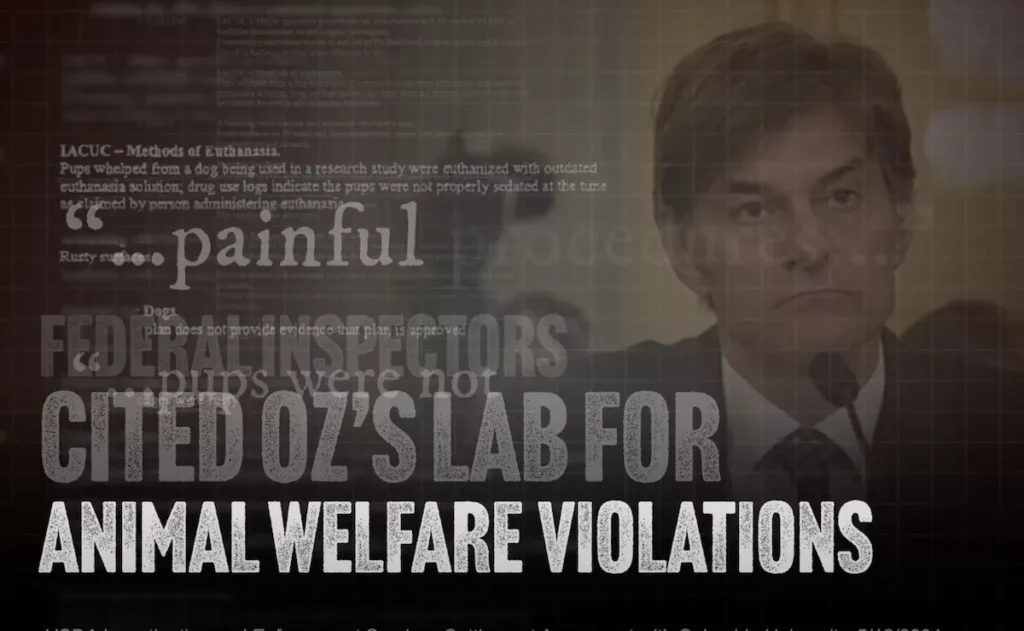Pittsburgh, PA — This week, Animal Wellness Action, a nonpartisan animal welfare organization committed to promoting legal protections for animals and enforcing anti-cruelty laws, announced a $250,000 advertising campaign highlighting cruel animal experiments Dr. Oz and his research team conducted between 1989 and 2010 at the University of Columbia. The mistreatment was severe enough to prompt the U.S. Department of Agriculture to issue a rare citation for Animal Welfare Act violations and to fine Columbia University for the abuses.
The first ad can be seen here. It began airing Monday night.

As numerous news outlets have reported, and Animal Wellness Action’s own review of published findings and federal enforcement actions have found, Dr. Oz and his research team experimented on and killed more than 1,000 animals in his laboratory. More than 325 of the victims were beagles.
“The abuses in Dr. Oz’s lab are startling,” said Dr. Deborah Wilson, M.D., chair of the board of Animal Wellness Action. “In hindsight, these violations are even more glaring because we now understand that the invasive procedures and killings yielded no treatments or new surgical procedures. It was a waste of taxpayer dollars that needlessly destroyed the lives of beagles and other animals.”
A veterinarian and postdoctoral veterinary fellow at the school went public in the early 2000s about research at the Dr. Oz lab, observing that the research team inflicted needless suffering on animals and that the experimental results did not translate into any public health benefits.
She witnessed the inhumane treatment of dogs in lab experiments investigating aspects of heart function over which Oz served as principal investigator, including leaving dogs in pain and paralyzed for weeks, with no discernible research benefit, before they were euthanized or died
The U.S. Department of Agriculture, whose animal-care personnel have responsibility for enforcing the Animal Welfare Act, cited and fined Columbia University for inhumane treatment of the animals at the lab. A settlement agreement was reached in May 2004. Here are just a few conclusions from the report:
- Protocols were approved that failed to provide a complete description of evaluating pain and discomfort, and drug administration
- Protocols were approved that indicated the improper administration of an injectable euthanasia agent
- Protocols did not reflect adequate details on search for alternative to painful procedures
- Pups whelped from a dog being used in a research study were euthanized with outdated euthanasia solution; drug-use logs indicate the pups were not properly sedated at the time as claimed by person administering euthanasia.
Dr. Oz was the “principal investigator” in these animal experiments and had his name attached to published academic papers grounded on these experiments.
“I am a conservative-leaning voter from western Pennsylvania, but I cannot vote for Dr. Oz after learning about these experiments,” said Natalie Ahwesh, director of grassroots advocacy for Animal Wellness Action and a resident of Pittsburgh. “I’ve been waiting for him to say he’s backing some or all of the dozen or so bills in Congress to reduce animal testing, such as the FDA Modernization Act, but we haven’t heard a word about his views on these measures.”
“Since news of these animal tests resurfaced during the campaign, Dr. Oz has provided no assurances that he’d be an active proponent of animal welfare in the Senate or that he now recognizes that these past uses of animals were morally and scientifically problematic,” said Wayne Pacelle, president of Animal Wellness Action.
On September 29th, the U.S. Senate unanimously passed the FDA Modernization Act 2.0, led by Senators Rand Paul, R-Ky., and Cory Booker, D-N.J., to eliminate a federal mandate for animal testing for all new drug development protocols. (You can view Sen. Paul’s press conference with Wayne Pacelle here.)
Lt. Governor John Fetterman, Oz’s opponent in the Pennsylvania race, has pledged strong support for the FDA Modernization Act 2.0 and other national animal welfare policies including a ban on the slaughter of horses for human consumption and a crackdown on puppy mills. While serving as Lt. Governor, he was active on state-level issues, advocating for an upgrade of the state’s anti-cruelty law.
